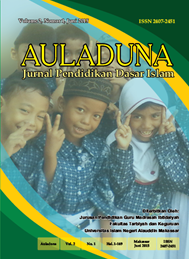PENDIDIKAN SEBAGAI MEDIA MOBILITAS SOSIAL
Abstract
Abstract: The educational system as a social media needs to change shortly as the society changes or vice versa. The changes in education should bring about improvement in the social life. The history have proved the linkages and close relationship between education on the one hand and the other social circumstances. From this, people can learn that social life in one period is determined by the education system that applied. Conversely, social educational system is strongly influenced by the style and circumstances that shape society. It looks that the relation between education system and the condition of a society which supports that system is a dilemma that tends to be static, because they both affect each other. This is because, on the one hand, education creates driving forces for progress and on the other hand, the community is a decisive force of civilization and knowledge and gives patterns and determine their own course of development and progress.
Abstrak: Sistem pendidikan sebagai media sosial seharusnya mengalami perubahan sesaat setelah masyarakat berubah atau sebaliknya, perubahan pada sistem pendidikan seharusnya membawa perbaikan di dalam kehidupan sosial kemasyarakatan. Sejarah menunjukkan kaitan dan hubungan yang erat antara pendidikan di satu pihak dan keadaan sosial kemasyarakatan dipihak lain. Dari padanya kita belajar bahwa corak masyarakat pada satu kurun waktu tertentu, sangat ditentukan oleh sistem pendidikan yang dilaksanakannya. Dan sebaliknya, sistem pendidikan sosial sangat dipengaruhi oleh corak dan keadaan masyarakat yang membentuknya. Kelihatannya kaitannya antar sistem pendidikan dan keadaan masyarakat yang mendukung sistem tadi merupakan suatu dilema yang cenderung bersifat statis, karena keduanya saling mempengaruhi. Hal itu disebabkan, di satu sisi pendidikan menciptakan kekuatan-kekuatan pendorong untuk mencapai kemajuan dan di sisi lain, masyarakat adalah kekuatan yang menentukan peradaban dan pengetahuan serta memberi corak dan menentukan arah perkembangan dan kemajuannya sendiri.
Downloads
References
Ahmadi, Abu Sosiologi Pendidikan. Cet. I; Jakarta: Rineka cipta, 2005
Al-Alî, Muhammad ‘Abd. The Family Structure in Islam. Maryland: International Grafic Printing Service, t.th.
Blumer, Herber. Symbolic Interaktionisem: Perspektif and Metod. Engliwood: Clips New Jersey.
Bosworth, C.E. “The Islamic Dynasties”. Diterjemahkan Ilyas Hasan. Dinasti-Dinasti Islam. Bandung: Mizan, 2001.
Claiton. The Functions of Social conflict. New York: The Fee Pes, 1997.
Departemen Pendidikan dan Kebudayaan. Kamus Besar Bahasa Indonesia. Jakarta : Balai Pustaka, 2002.
Durkhen. The Invations of Labor in Society. New York : The Fre Pres. T.tp.
Echols, John dan Hasan Shadili. Kamus-Indonesia. Jakarta: Gramedia, 1981.
Fahmi, Asma Hasan. al-Tarbiyah al-Islamiyah. Kairo: Lajnah al-Ta’lȋf wa al-Tarjamah wa al-Isyar, 1947.
Danandjaja. Class and Class Conflict Industrial Society. London: Hendli, 2000.
Jalal, Abdul Fattah. Asas-Asas Sosiologi Pendidikan Islam. Bandung: CV. Diponegoro 2001.
Nasr, Seyyed Hossein. “The Heart of Islam”. Diterjemahkan oleh Nurasia Faqih Sutan Harahap. Pesan-Pesan Universal Islam untuk Kemanusiaan. Bandung; Mizan, 2003.
Nasution, S. Sosiologi Pendidikan. Jakarta: Bumi Aksara, 2009.
Natsir, Muhammad. Capita Selekta. Bandung: Gravenhage, 1954.
Nawawi, Hadari. Organisasi Sekolah dan Pengelolaan Kelas sebagai Lembaga Pendidikan. Jakarta : Gunung Agung, 1995.
Partanto, Pius A. dan M. Dahlan. Kamus Ilmiah Populer. Surabaya: Arkola, 2003.
Purwanto. M. Ngalim. Sosial Pendidikan Teoritis dan Praktis. Bandung: Remaja Rosda Karya, 2001.
Sunarto, Kamanto. Pengantar Sosiologi. Jakarta: Fak. Ekonomi UI, 1993.
Syalabi, Ahmad. Tarikh al-Tarbiyah. Beirut: Dar al-Kasysyaf, 1954.
Yunus, Mahmud. Sejarah Pendidikan Sosial Islam. Jakarta: Mutiara, 1976.
Authors who publish with AULADUNA: Jurnal Pendidikan Dasar Islam agree to the following terms: Authors retain the copyright and grant Universitas Islam Negeri Alauddin Makassar right of first publication with the work simultaneously licensed under a Creative Commons Attribution License (CC BY-SA 4.0) that allows others to share (copy and redistribute the material in any medium or format) and adapt (remix, transform, and build upon the material) the work for any purpose, even commercially with an acknowledgement of the work's authorship and initial publication in Universitas Islam Negeri Alauddin Makassar. Authors are able to enter into separate, additional contractual arrangements for the non-exclusive distribution of the journal's published version of the work (e.g., post it to an institutional repository or publish it in a book), with an acknowledgement of its initial publication in Universitas Islam Negeri Alauddin Makassar. Authors are permitted and encouraged to post their work online (e.g., in institutional repositories or on their website) prior to and during the submission process, as it can lead to productive exchanges, as well as earlier and greater citation of published work (See The Effect of Open Access).

This work is licensed under a Creative Commons Attribution-ShareAlike 4.0 International License.

